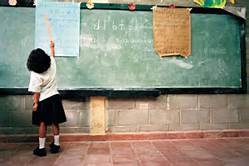Asia/India/22 de Julio de 2016/Fuente: The Times of India
RESUMEN: Entre todos los sectores, la educación escolar recibió la asignación máxima de Rs 24.130 millones de rupias. El ministro de Finanzas O Panneerselvam destacó el continuo enfoque del gobierno sobre el estado en la mejora de los servicios en las escuelas y reducir las tasas de deserción escolar, especialmente entre las niñas. El gobierno ha asignado Rs 2.705 millones de rupias para proporcionar ordenadores portátiles, libros de texto gratuitos, portátiles, kits educativos, uniformes, calzado, mochilas, pases de autobús y bicicletas a los estudiantes. En su intervención, el ministro de Finanzas dijo que el estado ha asignado Rs 2,329.15 millones de rupias para Sarva Shiksha Abhiyan y Rs 1,139.52 millones de rupias bajo Rashtriya Madhyamik Shiksha Abhiyan. En el marco del derecho de los niños a la Ley de educación gratuita y obligatoria, el ministro dijo que 86,199 niños han sido admitidos en las escuelas privadas en el presente curso académico, y Rs 125.70 millones de rupias se ha proporcionado para ello. Añadió que 4.339 aseos se construirán en las escuelas primarias y secundarias. El estado ha asignado Rs 333.61 millones de rupias para mejorar la infraestructura en las escuelas, con la asistencia de NABARD.Acogiendo con beneplácito la mayor asignación para la educación escolar, Ramu Manivannan, profesor y jefe del departamento de política y la administración pública en la Universidad de Madras, dijo: «Es un paso positivo. Sin embargo, los costos administrativos se incluye en el presupuesto. El gobierno también debe trabajar a la mejora de la relación alumno profesor, el nombramiento de los profesores de primaria y secundaria superior y la formación de los profesores «.
Among all the sectors, school education received the maximum allocation of Rs 24,130 crore. Finance minister O Panneerselvam highlighted the state government’s continued focus on improving amenities in schools and reducing dropout rates, especially among girls.
The government has allotted Rs 2,705 crore for providing laptops, free textbooks, notebooks, educational kits, uniforms, footwear, school bags, bus passes and bicycles to students.
In his speech, the finance minister said the state has allotted Rs 2,329.15 crore for Sarva Shiksha Abhiyan and Rs 1,139.52 crore under Rashtriya Madhyamik Shiksha Abhiyan, although TN is yet to receive «Government of India’s share of Rs 848 crore due» for the last fiscal.
Under the Right of Children to Free and Compulsory Education Act, the minister said that 86,199 children have been admitted in private schools in the current academic year, and Rs 125.70 crore has been provided for this.
He added that 4,339 toilets will be built in elementary and high schools this fiscal. The state has allotted Rs 333.61 crore to improve infrastructure in schools, with assistance from NABARD.
Welcoming the higher allocation for school education, Ramu Manivannan, professor and head of the department of politics and public administration at Madras University, said, «It is a welcome step. However, administrative cost is included in the budget. The government must also work towards improving teacher student ratios, appointment of teachers at primary and higher secondary level, and training of teachers.»
To reduce dropout among girls in Classes 10-12 in government and government aided schools, the state will continue its special cash incentive scheme, for which Rs 381 crore has been allocated. The FM also said that teacher-student ratio in government schools has shown improvement.
General secretary of TN Nursery Primary Matriculation and CBSE (private) schools association, K R Nandakumar, said that the government must hire more teachers for government schools. «There are around 7,000 vacancies for teachers in government schools. Also, the syllabus for Class 11 and 12 has not been changed in the last 12 years,» he added.
«Schools are trying to fill these vacancies on their own with funds from parent-teacher associations but end up paying salaries of just Rs 1,000-3,000. How can you expect teachers to offer their services sincerely with this salary?» felt education activist PB Prince Gajendra Babu.
Fuente: http://timesofindia.indiatimes.com/city/chennai/School-education-gets-booster-dose/articleshow/53330425.cms
Fuente de la imagen: http://www.reproduccionsocial.edusanluis.com.ar/2010/09/critica-la-educacion-neoliberal.html








 Users Today : 5
Users Today : 5 Total Users : 35460214
Total Users : 35460214 Views Today : 6
Views Today : 6 Total views : 3418901
Total views : 3418901